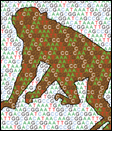Return to Online
Education Kit
|
 |
 |
 Previous Event | Next Event Previous Event | Next Event 
2006: Second Non-human Primate Genome is Sequenced
 Three research groups collaborated to produce a draft sequence of the rhesus macaque monkey genome. The rhesus genome is the only second non-human primate genome, after the chimpanzee, to be sequenced. Sequencing of the other primate genomes including the orangutan, marmoset and gorilla is underway. Overall, the rhesus genome shares 92 to 95 percent of its sequence with human and more than 98 percent of its sequence with chimpanzee. The rhesus genome will be of great help to medical researchers. Because of its similarities to humans, the rhesus macaque is the major non-human primate used in the study of human disease and drug development. The response of the rhesus to the simian immunodeficiency virus (SIV) makes it the best animal model for studying human immunodeficiency virus (HIV) infection. Independent assemblies of the rhesus genome were produced by researchers at the Baylor College of Medicine Human Genome Sequencing Center, Houston, TX; the Genome Sequencing Center at Washington University, St. Louis, Mo. and the J. Craig Venter Institute, Rockville, Md. Researchers have free, unlimited access to the genome from public databases. Three research groups collaborated to produce a draft sequence of the rhesus macaque monkey genome. The rhesus genome is the only second non-human primate genome, after the chimpanzee, to be sequenced. Sequencing of the other primate genomes including the orangutan, marmoset and gorilla is underway. Overall, the rhesus genome shares 92 to 95 percent of its sequence with human and more than 98 percent of its sequence with chimpanzee. The rhesus genome will be of great help to medical researchers. Because of its similarities to humans, the rhesus macaque is the major non-human primate used in the study of human disease and drug development. The response of the rhesus to the simian immunodeficiency virus (SIV) makes it the best animal model for studying human immunodeficiency virus (HIV) infection. Independent assemblies of the rhesus genome were produced by researchers at the Baylor College of Medicine Human Genome Sequencing Center, Houston, TX; the Genome Sequencing Center at Washington University, St. Louis, Mo. and the J. Craig Venter Institute, Rockville, Md. Researchers have free, unlimited access to the genome from public databases.
Rhesus Macaque Sequence Proposal 
To view this PDF you will need Adobe Acrobat Reader. 
 Previous Event | Next Event Previous Event | Next Event 
Last Reviewed: April 17, 2008
|

